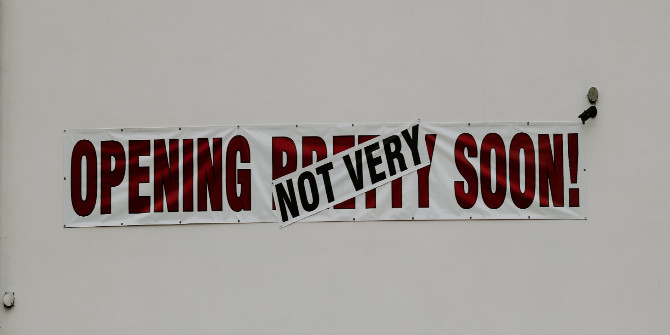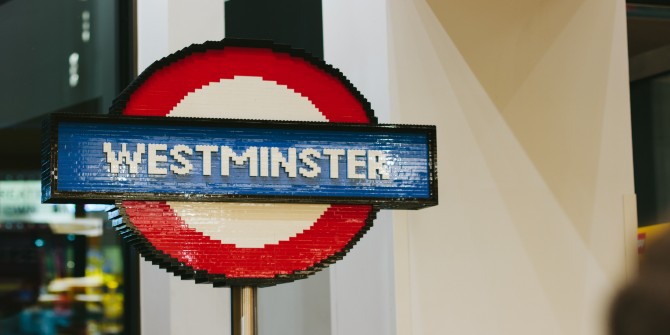
 To what extent is Prime Minister’s Questions time used by the PM to ask questions of the opposition? Mark Shephard and Daniel Braby compare weighted data for four PMs and find that questioning of the opposition has increased over time, it varies by inter- versus intra-government PM rotations, and is positively associated with approval ratings.
To what extent is Prime Minister’s Questions time used by the PM to ask questions of the opposition? Mark Shephard and Daniel Braby compare weighted data for four PMs and find that questioning of the opposition has increased over time, it varies by inter- versus intra-government PM rotations, and is positively associated with approval ratings.
Prime Minister’s Questions (PMQs) is an important procedure in the Westminster system serving as one of the few mediums through which the PM is held directly accountable to the Parliament. Its weekly broadcasting is widely viewed (both at home and even abroad), and disseminated by the press, making it a well-known parliamentary procedure among the public. Even if other parliamentary forums, such as the Liaison Committee, offer better avenues for scrutiny and influence, PMQs still offers a more frequent opportunity for fulfilling these functions, as well as for the fulfilment of a variety of other functions such as constituency representation and tension release.
Expectations are that questions will be asked of the Prime Minister (PM) about government actions (or inactions) and their consequences, and that the PM will respond to these. However, leaders such as David Cameron have lamented about the state of ‘Punch and Judy politics of Westminster’. Consequently, little attention has been paid to the extent to which the PM uses the procedure to ask questions of the opposition. Counter-questioning provides a means of equivocation for the PM without appearing substantively weak on an issue the question invokes.
Comparisons of questions across time/leaders in empirical studies have been problematic as the procedure has increased in duration over time. Under Tony Blair, PMQs moved from 15 minutes on Tuesdays and Thursdays to 30 minutes on Wednesdays. By Theresa May’s first term, the average length of PMQs had extended to around 45 minutes on Wednesdays.
Controlling for approximate duration of PMQs using word count, and focusing on the last four PMs for which we have first year data, we find that the number of order paper questions reached has stayed fairly static over time (albeit slightly higher under Cameron). However, the average number of contributions containing a question (‘?’) have almost halved from Blair to May, while the number of questions (‘?’) asked by the PM have increased since Blair (and most markedly under Cameron, who was three times more likely to pose a question than Blair).
Controlling for who the questions by the PM are directed at, we find that the proportion of PM questioning of the Leader of the Opposition has increased quite noticeably post-Blair. Considering PM questions targeting both the Leader of the Opposition and the opposition in general, we find that while Cameron asked approximately one question of the opposition per 1000 words on average, the average for May and Blair was one for every 3571 words, while Brown was one for every 4762 words.
Interestingly, and to be expected, new PMs leading a change of party in government (Blair and Cameron) and not a change of PM within the same party of government (Brown and May) are more likely to blame past governments for their actions and/or inactions. However, general critique of the opposition has more than doubled for PMs post-Blair, more markedly among PMs elected during a rotation of parties in Government.
Using public opinion poll data on PM approval rates over time, we also found that PMs are more likely to question the opposition at times when their own approval ratings are highest. This suggests that PMs are more bullish and more likely to ask questions of the opposition when they are riding higher in the polls.
Data for the first year of Boris Johnson are not yet complete, and are atypical in a number of ways. Boris’s presence at PMQs has been hampered by two major issues: a) Brexit challenges that manifested as a prolonged proroguing of Parliament, the calling of a General Election; and b) the COVID-19 crisis in which the PM himself was hospitalised and Parliament recessed early and then moved online. Consequently, data show a greater degree of both comparative absence and gaps in the parliamentary calendar for Boris Johnson compared with the previous four PMs.
Duration of PMQs under Boris Johnson has also varied from just over 30 minutes to nearly an hour, albeit just over 30 minutes seems to be the new normal for this Speaker. An examination of the first PMQs of Boris Johnson’s reveals that 25% of all ‘?s’ (14/56) asked came from the PM. This suggests that counter-questioning may have worsened under Johnson. Ultimately, events of 2019 and 2020 raise some serious challenges for the comparative empirical study of counter-questioning.
One of the innovations of Boris Johnson has been the introduction of a People’s PMQs in which the PM selects and responds to questions sent in by the public. This arguably provides another avenue for the PM to be held accountable, however, the PM not only selects the questions that he responds to, but the member of the public asking the question has no right to a supplementary follow-up question. Consequently, the prospects of this procedure for holding the PM accountable are negligible to say the least.
_____
Note: the above draws on the authors’ published work in the Journal of Legislative Studies. All articles posted on this blog give the views of the author(s), and not the position of LSE British Politics and Policy, nor of the London School of Economics and Political Science. Featured image credit: by Max Kukurudziak on Unsplash.







